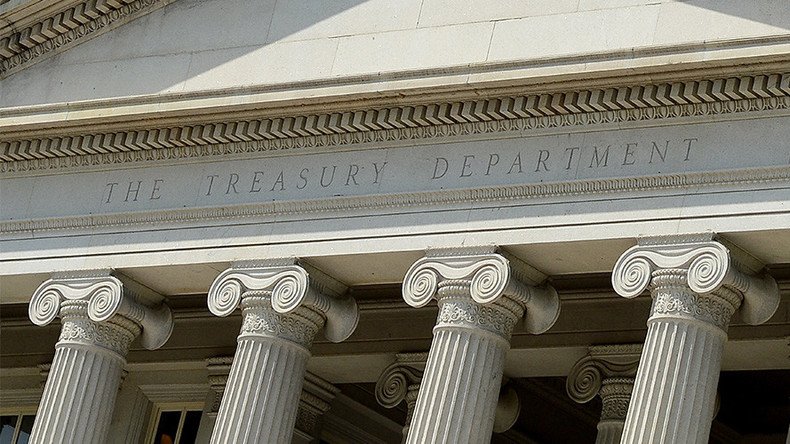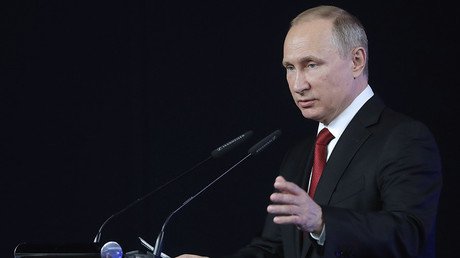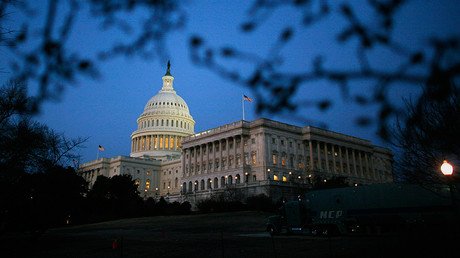New US sanctions 'destructive,' hinder improvement of bilateral relations – Russian Foreign Ministry

Washington's expansion of sanctions on a number of Russian individuals and organizations over the situation in Ukraine "will not have a desired effect" on those on the list, but will only hinder the already difficult process of improving US-Russia relations, Moscow says.
"Yet again, sanctions are implemented out of thin air," Russia's Foreign Minister Sergey Lavrov said at a news conference Tuesday, adding that such US policy "does not improve the atmosphere" of world politics.
Constant references to anti-Russia measures in Ukraine are not taken seriously any more by any of the observers of the situation, Lavrov told reporters in Moscow following a meeting with his French counterpart, Jean-Yves Le Drian.
The new sanctions only demonstrate US officials' "anti-Russia obsession," which has already "crossed the line," Russia's most senior diplomat said.
‘Don’t want to be handcuffed to Minsk’: #Tillerson advocates ‘flexibility’ on Ukraine crisis & Russia https://t.co/n3HxIu47IN
— RT (@RT_com) June 15, 2017
"We have said from the very beginning of Washington's exceptionally destructive policy in regard to applying anti-Russia sanctions, that [such measures] will not and cannot have an effect desired by the US on our individuals or entities," Russia's deputy foreign minister, Sergey Ryabkov told RIA Novosti Tuesday.
Moscow "will judge the US administration's policy towards Russia by its actions" rather than by any statements, promises or "hints," and the latest moves "speak for themselves," Ryabkov added.
"In what's happening now, we don't see any sense but to try and further hinder the already difficult process to improve [bilateral] relations," Ryabkov told Interfax.
On Tuesday, the US Treasury expanded its list of those sanctioned over alleged activities in Eastern Ukraine and Crimea. It now includes almost 40 individuals and organizations, including Russia's deputy minister of economic development, Sergey Nazarov.
"The U.S. Department of the Treasury’s Office of Foreign Assets Control (OFAC) today reinforced existing sanctions on Russia by designating or identifying a range of individuals and entities involved in the ongoing conflict under four Executive orders (E.O.s) related to Russia and Ukraine," the US Treasury said in a statement, adding that "OFAC designated 38 individuals and entities under Ukraine-related authorities."
It further claims the steps are consistent with Washington's aim of seeking a "diplomatic solution to the crisis in Ukraine" and to "facilitate Crimea's return to Ukraine."
The restrictions will stay in place until the Minsk peace agreements to resolve the Ukrainian crisis are "fully honored" by Moscow, Washington said.
"US sanctions related to Crimea" – spurred by Crimea's reunification with Russia following a 2014 referendum and considered an "annexation" by Washington – will not be lifted until the peninsula becomes part of Ukraine, Tuesday's statement said.
The new sanctions come shortly after a new set of restrictive measures was approved by the US Senate. Those were pushed forward as punishment for Russia's alleged meddling in the US presidential election, "aggression" in Ukraine, and support for the Syrian government of Bashar Assad.
READ MORE: ‘Peculiar move’: Merkel lashes out at new US anti-Russia sanctions
Russian President Vladimir Putin said sanctions would "complicate Russia-American relations," but that it was "premature" to talk about any retaliatory actions.
"If there were no situation with Crimea and other problems, they would have invented something else to contain Russia," Putin said.
Russia wasn't the only country to criticize the Senate's decision. In a scathing joint statement, Germany and Austria called the sanctions "unacceptable" for affecting European business interests, particularly those which deal with Russian oil and gas companies, including on the Nord Stream 2 pipeline project.
Germany, Austria hit out at US over new anti-Russian sanctions https://t.co/btjY4kb6Aj
— RT (@RT_com) June 16, 2017
"Europe's energy supply is a matter for Europe, and not the United States of America," German Foreign Minister Sigmar Gabriel and Austrian Chancellor Christian Kern wrote in a joint statement.
Washington's policy of "threatening" European enterprises working with Russian partners "with penalties on the US market would add an absolutely new and highly negative aspect in relations between the US and Europe," the statement said.















